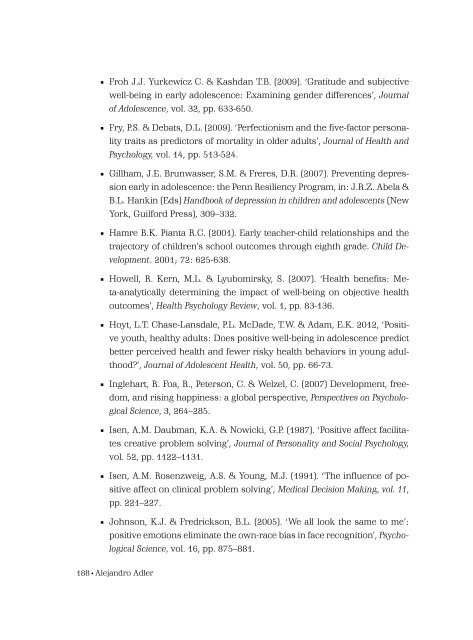55 mm 30 mm
El-Bienestar-Subjetivo-en-America-Latina-Libropdf
El-Bienestar-Subjetivo-en-America-Latina-Libropdf
You also want an ePaper? Increase the reach of your titles
YUMPU automatically turns print PDFs into web optimized ePapers that Google loves.
■■<br />
Froh J.J. Yurkewicz C. & Kashdan T.B. (2009). ‘Gratitude and subjective<br />
well-being in early adolescence: Examining gender differences’, Journal<br />
of Adolescence, vol. 32, pp. 633-650.<br />
■■<br />
Fry, P.S. & Debats, D.L. (2009). ‘Perfectionism and the five-factor personality<br />
traits as predictors of mortality in older adults’, Journal of Health and<br />
Psychology, vol. 14, pp. 513-524.<br />
■■<br />
Gillham, J.E. Brunwasser, S.M. & Freres, D.R. (2007). Preventing depression<br />
early in adolescence: the Penn Resiliency Program, in: J.R.Z. Abela &<br />
B.L. Hankin (Eds) Handbook of depression in children and adolescents (New<br />
York, Guilford Press), <strong>30</strong>9–332.<br />
■■<br />
Hamre B.K. Pianta R.C. (2001). Early teacher-child relationships and the<br />
trajectory of children’s school outcomes through eighth grade. Child Development.<br />
2001; 72: 625-638.<br />
■■<br />
Howell, R. Kern, M.L. & Lyubomirsky, S. (2007). ‘Health benefits: Meta-analytically<br />
determining the impact of well-being on objective health<br />
outcomes’, Health Psychology Review, vol. 1, pp. 83-136.<br />
■■<br />
Hoyt, L.T. Chase-Lansdale, P.L. McDade, T.W. & Adam, E.K. 2012, ‘Positive<br />
youth, healthy adults: Does positive well-being in adolescence predict<br />
better perceived health and fewer risky health behaviors in young adulthood?’,<br />
Journal of Adolescent Health, vol. 50, pp. 66-73.<br />
■■<br />
Inglehart, R. Foa, R., Peterson, C. & Welzel, C. (2007) Development, freedom,<br />
and rising happiness: a global perspective, Perspectives on Psychological<br />
Science, 3, 264–285.<br />
■■<br />
Isen, A.M. Daubman, K.A. & Nowicki, G.P. (1987). ‘Positive affect facilitates<br />
creative problem solving’, Journal of Personality and Social Psychology,<br />
vol. 52, pp. 1122–1131.<br />
■■<br />
Isen, A.M. Rosenzweig, A.S. & Young, M.J. (1991). ‘The influence of positive<br />
affect on clinical problem solving’, Medical Decision Making, vol. 11,<br />
pp. 221–227.<br />
■■<br />
Johnson, K.J. & Fredrickson, B.L. (2005). ‘We all look the same to me’:<br />
positive emotions eliminate the own-race bias in face recognition’, Psychological<br />
Science, vol. 16, pp. 875–881.<br />
188 Alejandro Adler





